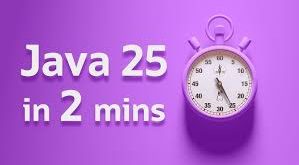Nieuws
Oracle brengt Java 25 uit
Oracle heeft vandaag de beschikbaarheid van Java 25 aangekondigd, de meest recente versie van ’s werelds toonaangevende programmeertaal en ontwikkelplatform. Java 25 (Oracle JDK 25) helpt organisaties bij de groei van hun bedrijf door duizenden verbeteringen door te voeren die de productiviteit van ontwikkelaars verhogen en de prestaties, stabiliteit en beveiliging van het platform verbeteren. Bovendien biedt Oracle tenminste acht …
Read More »Java 25 launch livestream today at 17:00
Java25 Launch Livestream today at 17:00 https://lnkd.in/eyExpkBp
Read More »Ticket registration J-Fall 1st batch opens September 25th at 12:00
We have important news: this year you have two chances to get your hands on the always-sold-out tickets for J-Fall. To give more people this opportunity, we’re doing the ticket registration in two batches this year. The first batch of J-Fall tickets (for NLJUG Members only) will be available online at http://www.jfall.nl on Thursday, September 25, at exactly 12:00 PM. …
Read More »Java Magazine 3 is uit
Java Magazine 3 is uit. ‘Architecture as cod’ , ‘Java communities in Nederland’ Reactive frontend uit de backend’ Je kan javamagazine hier digitaal doorbladeren.
Read More »NLJUG Innovation Award
NLJUG INNOVATION AWARD 2025 Is your company an innovator and do you have a successful, innovative, responsible and/or large-scale project? Then this is your chance to be in the spotlight! The NLJUG Innovation Award will be presented for the seventh time during J-Fall and we are looking for the most innovative project. Every NLJUG business partner that submits a project …
Read More »De uitkomsten van de NLJUG Leden-enquête
Een aantal maanden geleden heeft onze stagiaire Sander Aarts als onderdeel van zijn afstudeerproject Commerciele Economie een leden-enquête uitgevoerd onder alle NLJUG leden. Naast dat de response (meer dan 800) overweldigend was, realiseren wij ons dat we ondanks dat zijn scriptie alweer van een tijdje geleden is , de uitkomsten en conclusie over dit onderzoek nog niet breed is gedeeld …
Read More »A Well-Attended Evening at the NLJUG Speaker Academy
Despite the rising temperatures, the first of three NLJUG Speaker Academy sessions was a great success last night. The evening was hosted by, among others, Bert Jan Schrijver. These sessions are all about sharing knowledge on the do’s and don’ts of giving a successful conference talk. Knowledge sharing is a core value of NLJUG. If we can share that knowledge …
Read More »Inside Nedap: How Bram codes for the cloud – Java, Kotlin, Kafka & edge devices — a peek into Nedap’s hybrid cloud architecture.
The code you write in the morning can be live and used by clients that same day. An interview with Bram Klein Gunnewiek from Nedap Security At Nedap Security, cutting-edge technology and a people-centered work culture go hand in hand. The team develops innovative access control solutions that go far beyond traditional security systems. Their cloud-native platform, AtWork, is used …
Read More »Ever dreamed of becoming a tech speaker, but not sure where to start?
The NLJUG Speaker Academy is here to help you take the stage, even if you don’t (yet) consider yourself an expert. We’re kicking things off with our first session on 𝐉𝐮𝐧𝐞 30𝐭𝐡 𝐚𝐭 18:00 𝐢𝐧 𝐔𝐭𝐫𝐞𝐜𝐡𝐭 (food & drinks included) Led by Java Champions Bert Jan Schrijver and Brian Vermeer, this program will help you: ✅ Find your talk topic …
Read More » NLJUG – Nederlandse Java User Group NLJUG – de Nederlandse Java User Group – is opgericht in 2003. De NLJUG verenigt software ontwikkelaars, architecten, ICT managers, studenten, new media developers en haar businesspartners met algemene interesse in alle aspecten van Java Technology.
NLJUG – Nederlandse Java User Group NLJUG – de Nederlandse Java User Group – is opgericht in 2003. De NLJUG verenigt software ontwikkelaars, architecten, ICT managers, studenten, new media developers en haar businesspartners met algemene interesse in alle aspecten van Java Technology.









